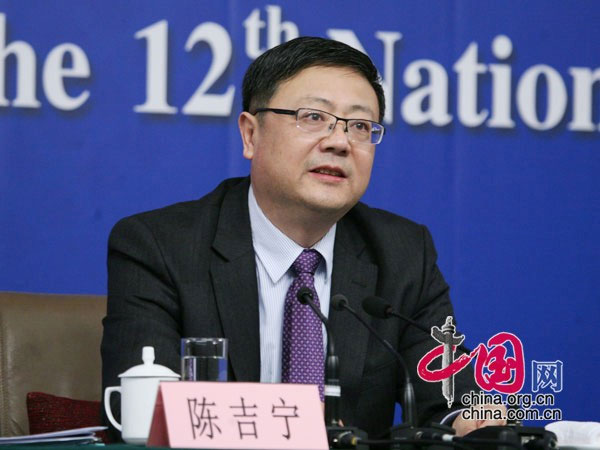Extra efforts needed to battle smog: minister
Xinhua, March 9, 2015 Adjust font size:
|
|
|
Chinese Minister of Environmental Protection Chen Jining gives a press conference for the third session of China's 12th National People's Congress (NPC) in Beijing, capital of China, March 7, 2015. [Xinhua] |
China needs to make "extra efforts" to battle the grave air pollution that has raised public concern, the newly appointed Environmental Protection Minister said Saturday.
About 80 percent of more than 300 cities failed to meet the official standard of air quality last year, with smog frequently choking the Yangtze River and Pearl River deltas as well as the Beijing-Tianjin-Hebei region, said minister Chen Jining, an environmental scientist and former president of Tsinghua University.
The Chinese government issued the Air Pollution Prevention and Control Action Plan in September 2013 to control PM2.5, or airborne particles with a diameter of less than 2.5 microns, and reduce the number of smoggy days.
China has been promoting desulfurization and denitration of newly installed power plants. More than 6 million old vehicles and heavy-polluting vehicles were weeded out last year, exceeding the total figure of the previous three years, he said.
Environmental protection authorities transferred 2,080 cases of suspected violation of laws to public security agencies, which doubled the total figure of the previous 10 years, he added.
"No country in the world is making such great efforts as China to combat air pollution within so short time," he told a press conference.
"We can achieve the goal of greatly improving air quality, but the difficulty is formidable," he said. "We need to make extra efforts."
The government would strengthen the implementation of the revised environmental protection law and raise the capacity of pollution control in a scientific and systematic way, he said.
The ministry summoned leaders from the cities of Linyi in east China's Shandong Province and Chengde in the northern province of Hebei, urging them to strengthen inspections and impose severe penalties on polluters.
A good law should not become "paper tiger". We must use it as a sharp weapon, Chen said.
Local governments found slack in supervision or inactive in pollution control would face punishment, he said.
The government would also ensure information transparency and protect the public's right to know, participate in and supervise the fight against air pollution.
